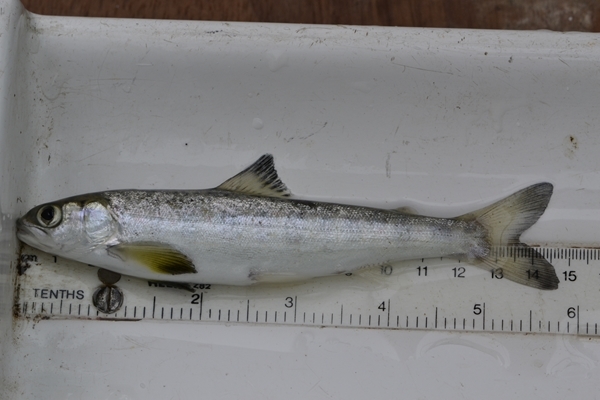
THE publication from fisheries scientists at the Game & Wildlife Conservation Trust (GWCT) illustrates the challenges facing Britain’s freshwater fish.
Monitoring by the GWCT shows the lowest number of smolts (juvenile salmon) leaving the River Frome since records began in 1995 - a figure that was less than half of the average seen in the last decade.
It is likely to be the result of an unseasonably warm winter in 2015/16 – including the highest average December water temperature this millennium – impacting survival of both eggs and juveniles. This issue is not just a local one, as Environment Agency data shows a national decline in recruitment of salmon from the 2015/16 spawning season.
Experts at the Trust warn that the low number of smolts, leaving these shores for their North Atlantic feeding grounds, is likely to result in a considerable reduction in the number of adult salmon returning to the river in 2018 and 2019.
“There is currently a lot of focus on lower survival of salmon at sea but these results highlight the importance of the freshwater component of their life cycle and its potential to affect stocks in years to come,” said Rasmus Lauridsen, who is head of fisheries research at GWCT.
The report also investigates whether the size of salmon, when they go to sea, is linked to their chance of survival, a subject which a PhD student at the Trust is investigating further. Other topics covered include the PhD studies into the impact of low flows on the ecosystem, how water crowfoot (Ranunculus) can be managed to improve both the number and quality of fish in chalk streams and how the dams created by re-introduced beavers might be affecting brown trout.
The organisation is also expanding its research from freshwater to sea, heading up SAMARCH, a €7.8m five-year project (2017 to 2022), that is part-funded by the EU’s Interreg Channel VA programme. The GWCT is the lead partner of 10 organisations with five partners on either side of the English Channel, developing their understanding of what happens to salmon and sea trout when they leave our rivers for the sea following a decline of 70% since the 1970s.
To track sea trout, scientists at GWCT have inserted acoustic and data storage tags into the fish.
Dr Celine Artero, who is a senior fisheries scientist at the Trust, is pleased to report that four of the 16 tags inserted into adult sea trout last winter have now been recovered. Three tags from the fish trap on the River Bresle and one tag picked up by a walker on a beach in Cornwall, which was from a sea trout tagged on the Tamar. Celine will download the data to unearth the secrets of where these fish spent their time at sea.
Rasmus added: “Data from these tags will provide new knowledge about the behaviour of sea trout at sea enabling knowledge-based management to protect this iconic species in our coastal waters.”
You can read the fisheries report in full here
Notes to editors
The Game & Wildlife Conservation Trust – providing research-led conservation for a thriving countryside. The GWCT is an independent wildlife conservation charity which has carried out scientific research into Britain’s game and wildlife since the 1930s. We advise farmers and landowners on improving wildlife habitats. We employ 22 post-doctoral scientists and 50 other research staff with expertise in areas such as birds, insects, mammals, farming, fish and statistics. We undertake our own research as well as projects funded by contract and grant-aid from Government and private bodies. The Trust is also responsible for a number of Government Biodiversity Action Plan species and is lead partner for grey partridge and joint lead partner for brown hare and black grouse.
For information, contact:
Eleanor Williams
Telephone: 07592 025476
Email: press@gwct.org.uk